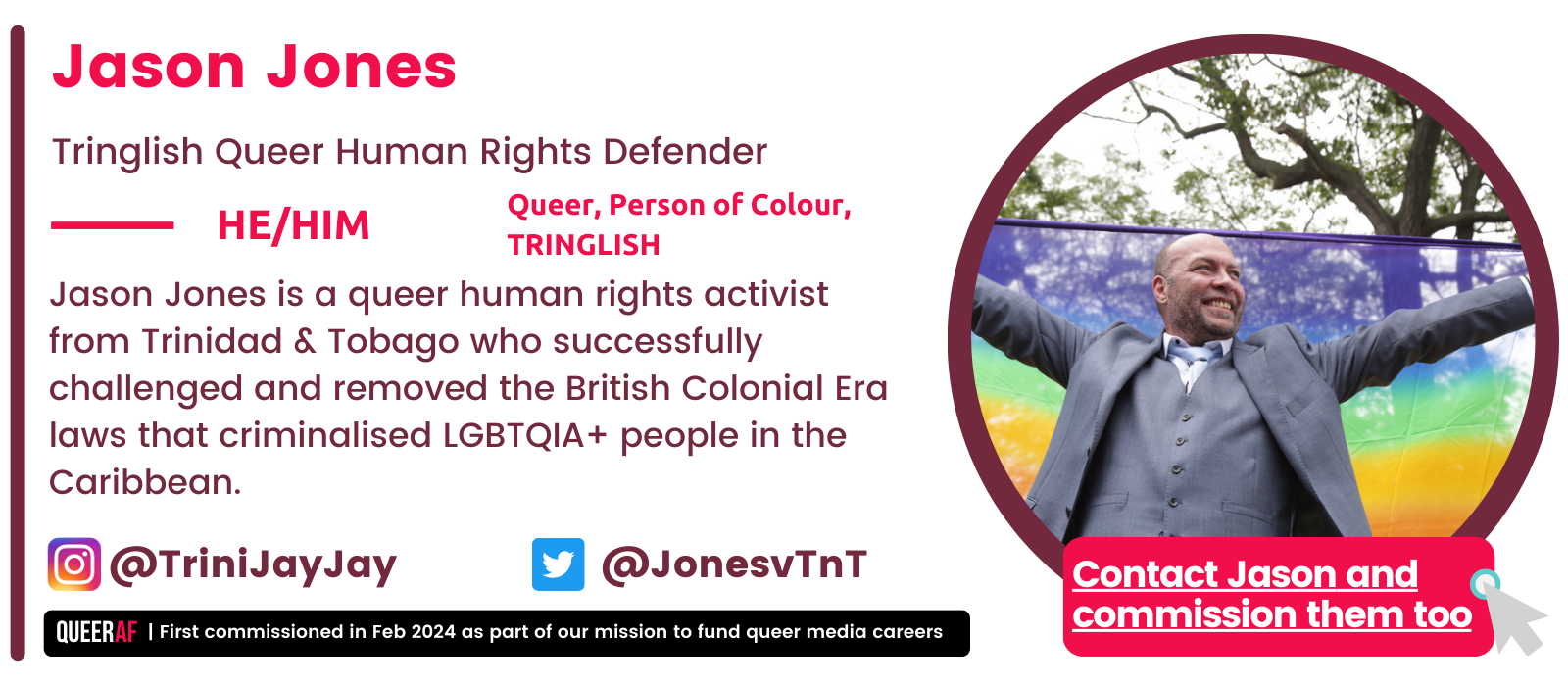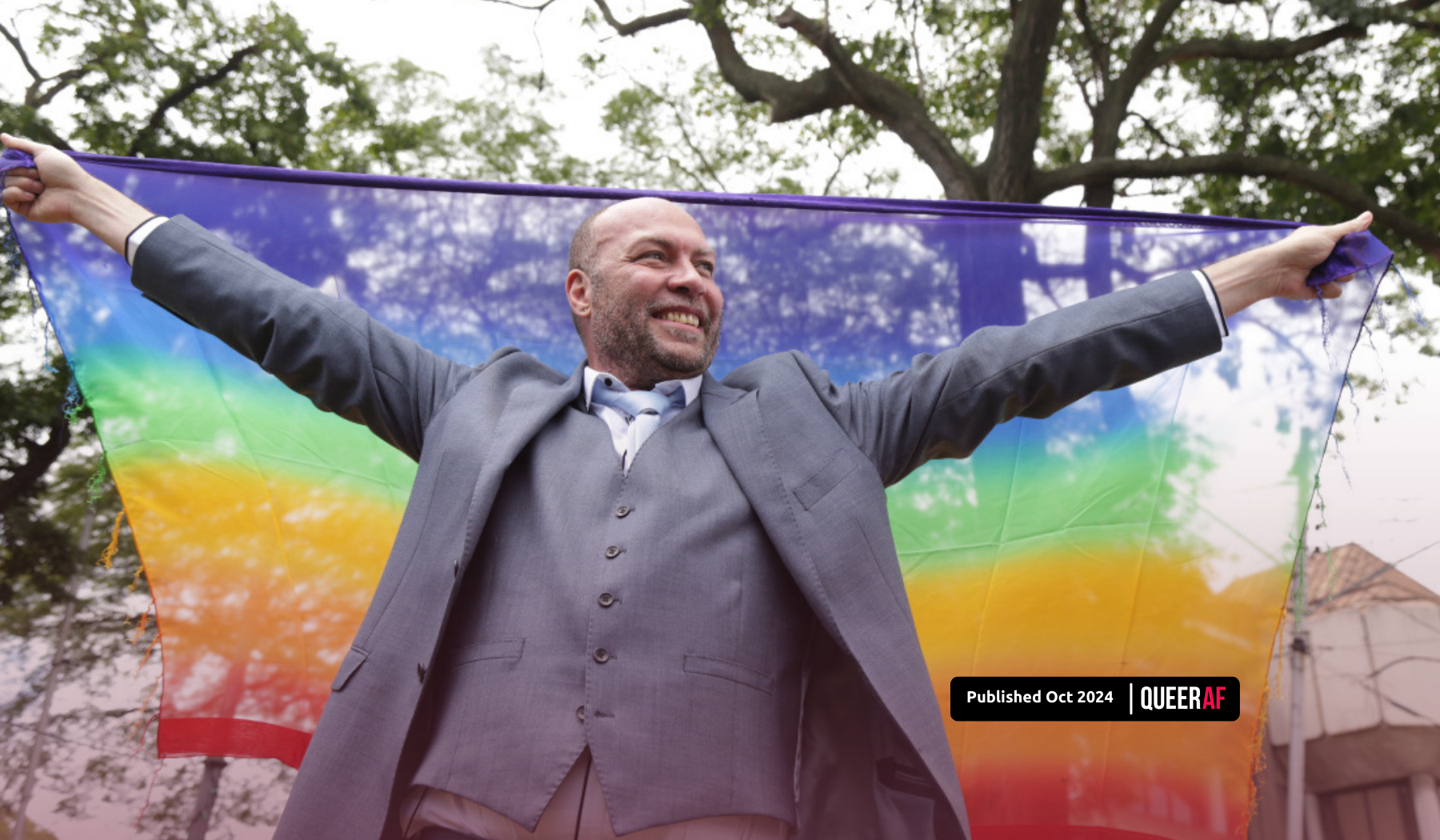Jason Jones is a Queer human rights activist from Trinidad & Tobago who successfully challenged and removed the British Colonial Era laws that criminalised LGBTQ+ people in the Caribbean - and this October, he’s QueerAF's UK Black History Month guest editor.

Ever since my birth in Trinidad in the 1960s, as a Black, mixed race, Queer effeminate, nonbinary man, I have found myself feeling marginalised and excluded from society.
In Trinidad and Tobago, we have the British Colonial-era “buggery” law, which criminalised me being Gay and threatened me with up to 25 years imprisonment. It’s a law I’ve spent the last 36 years fighting against.
Growing up under this law encouraged daily verbal harassment and threats of violence to queer folks all over the Caribbean. In some places, this law remains in force.
The result of this was being made homeless by my Black Trinidadian family for performing drag. That’s just one example of how I faced homophobia directly.
My plan to leave Trinidad and move to London when I was 21 in 1985 was designed to find safety. Instead, I found my White English family were not only incredibly racist but hid my existence from the world. They would only let me visit my grandma at night, so the neighbours didn’t see me. I left to escape homophobia, but found more of it - and racism entwined.
So I dedicated my life to fighting against injustices that forced Black queer people like me to hide in the closet. So far, I’ve led campaigns that have helped to decriminalise homosexuality in six countries, and have been an avid fighter of our rights in the UK too, where I helped secure the first legal acknowledgement of same-sex relationships in British law.
But many years on, Black, queer and especially trans people of colour still feel invisible. People like Marsha P Johnson and Bayard Rustin are only now receiving their flowers amid movements like the Black Lives Matter movement and the rise of Queer identities. But little of that has transferred to wider representation in popular culture - where its impact can be most felt.
The media seems to have only two spaces for Queer Trans Interxex people of colour (QTIPOC): either it’s doom, gloom and death or it’s Hollywood glamour and fabulousness. There’s no middle ground. Because of this, it’s challenging to find representation that reflects the day-to-day existence of most QTIPOC.
It’s one of the reasons I reached out to QueerAF to do something for QTIPOC in observance of Black History Month. Over the next month, we’ll be releasing a new article from an emerging or marginalised Black queer creative each week. With QueerAF, we’ve supported these creatives to write critical articles and model the change we want to see: media giving platforms, agency and investment to Black queer and Trans+ creatives.
But media representation doesn’t sit in a vacuum; it needs to be tackled as part of a myriad of approaches that better centre the voices which we can thank for so much of our liberation.
One of the insights we quickly saw from working with the four black creatives in this series is the lack of data there is to back up the analysis and lived experiences of Queer Black people. Although there is a lot of data on what it’s like for the homogenous white LGBTQIA+ community, there is little data about the Black LGBTQIA+ community. We’ll be drilling down into this in areas like healthcare, as we’ll look at next week, but in a word the reason is racism. And it shows up in different ways. In healthcare, societal racism makes institutional racism show up in the form of not believing Black people about their own health, much like trans people face ‘trans broken arm’ syndrome.
Later in the month, we’ll explore how QTIPOC communities have been appropriated and commodified, taking away safety and agency from communities, only for them to be lost in modern, white fashion trends. This work is then left, as another article will explore, to Black people to unpick - leaving QTIPOC more work to do on top of dealing with the internalised homophobia, pressure and guilt systems we all grew up with.
Our resolve to address these issues starts at home. Yes, here in the UK, where the heinous history of British Colonial homophobic laws still blight over 30 Commonwealth countries today, encouraging further hatred and bigotry against LGBTQIA+ people in the Global South. As a country, we should question why we think that’s no longer ‘a British issue’.
Especially when we reflect on how religious organisations based in both Europe and North America continue to preach and fund ongoing hate in the Global South. US Evangelical churches alone have spent over $280M in the last 17 years spreading misinformation & toxic homophobia across Commonwealth countries - Reuters
We also need to address racism within our own community. As a community that understands the power of movement building and how, when we put our minds to it, we can achieve humongous change - that work is long overdue. We must engage with DEI training at every level in every LGBTQ+ organisation and group. And when our organisations don’t do it, we should start it, request it - or do the work on our own.
I know this change is possible because, although plenty of work is left to do, it has already begun. Many of us are working to build better, more inclusive QTIPOC spaces. Next year I and six other QTIPOC Black Queer Brits are being inducted into the Black British Cultural Archive in Brixton as LGBTQ+ Icons of Black Britain. This is the first time in the 40-year history of the archive that this is happening! I’m very proud to be one of the first, and more importantly, to see our contributions being recognised in Black British history.
As this series unfolds, you’ll see just how incredible it is to listen to, empower, and make space for the Black, queer and Trans+ creatives who are the storytellers we should trust to bring the stories we all deserve to hear, and revel in, to light. We can learn so much by reflecting on and from LGBTQIA+ history - especially when we learn from all of queer history.

More than a month
At QueerAF, we're obsessed with journalism and storytelling that puts lived experience in the driving seat.
So we're thrilled to be able to bring you Jason's perspective - and those of several other Black queer creatives - this Black History Month.
As a small indie publisher, we've done this series on a shoe-string budget. Everyone's been paid, and received mentoring and support - but imagine what we could do with more resources.
This month, our ask to you is this: if you learn, grow from or enjoy our UK Black History Month series, consider investing in it.
Help us fund even more Black, queer and trans creatives to tell stories - all year around.










